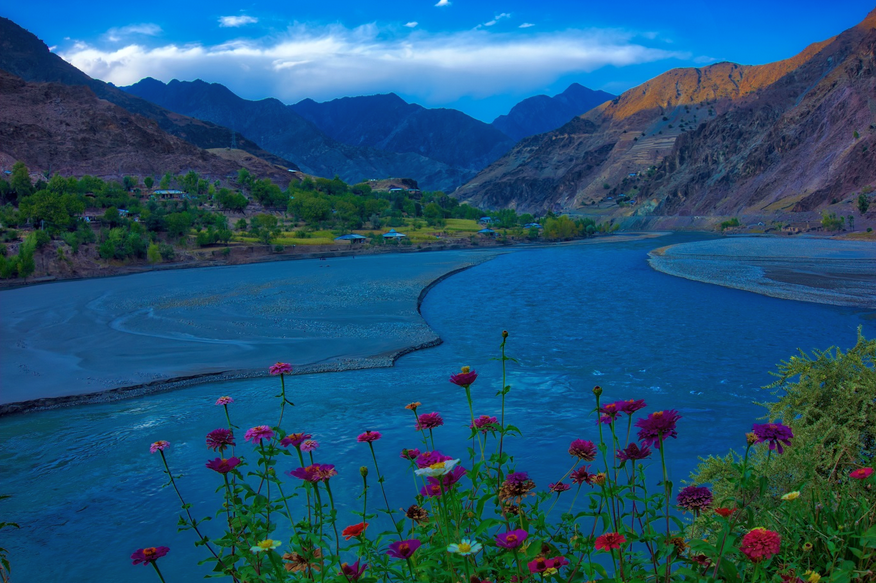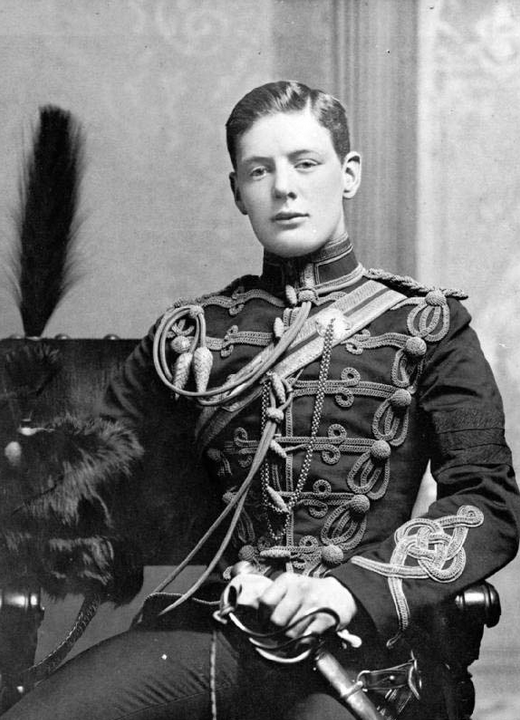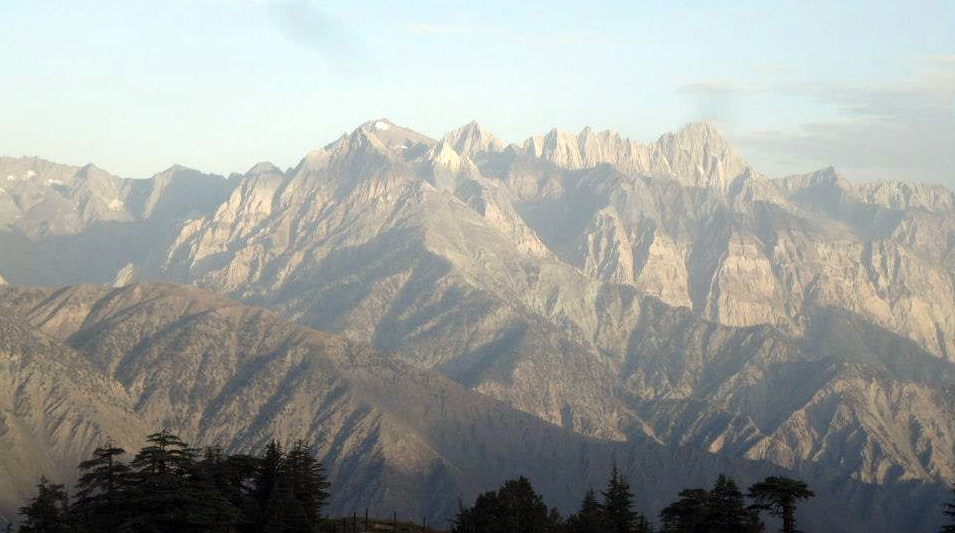Editor’s note: Here follows the eighteenth, and final, chapter of The Story of the Malakand Field Force: An Episode of Frontier War, by Winston S. Churchill (published 1898). All spelling in the original.
CHAPTER XVIII, AND LAST: THE RIDDLE OF THE FRONTIER
"Myself when young did eagerly frequent
Doctor and saint, and heard great argument
About it and about, but evermore
Came out by the same door wherein I went."
OMAR KHAYYAM.
These pages, which have chronicled a variety of small incidents, have hitherto concerned themselves little with the great matters out of which those incidents have arisen. As an opening chapter should lead the reader to expect the considerations that the book contains, so the conclusion should express the opinion he might form from the perusal. When, at an earlier period, I refrained from discussing the question of frontier policy, I declared that its consideration was only postponed until a more propitious moment. That moment now presents itself. There will not be wanting those who will remind me, that in this matter my opinion is not supported by age or experience. To such I shall reply, that if what is written is false or foolish, neither age nor experience should fortify it; and if it is true, it needs no such support. The propositions of Euclid would be no less indisputable were they propounded by an infant or an idiot.
The inquirer sees the vast question unfold itself with feelings like those with which the fisherman in the old story watched the genius he had unwittingly released, rise from the bottle in clouds of smoke, which overspread the whole sky. Every moment the subject appears not only wider but deeper. When I reflect on the great number of diverse and often conflicting facts which may be assembled under every head—military, economic, political or moral—and consider the accumulations of specialised and technical knowledge necessary for their proper appreciation, I am convinced that to compass the whole is beyond the mind and memory of man. Of such a question it is difficult to take broad views, and dangerous to generalise. Still less is it possible, as many people appear to imagine, to settle it with a phrase or an epigram. A point is reached where all relation between detail and proportion is lost. It is a picture of such great size that to see it all, it is necessary to stand so far off that neither colours nor figures are distinguishable. By constantly changing the point of view, some true perspective is possible, and even then the conception must be twisted and distorted, by the imperfections of the mental mirror.
Sensible of the magnitude of the task, and conscious of my own weakness, I propose to examine in a spirit of cautious inquiry and of tolerance the present “Forward Policy,” and thence to approach the main question, to the answer of which that policy is only a guess.
I must revert to a period when the British power, having conquered the plains of India and subdued its sovereigns, paused at the foot of the Himalayas and turned its tireless energy to internal progress and development. The “line of the mountains” formed a frontier as plain and intelligible as that which defines the limits of the sea. To the south lay the British Empire in India; to the north were warlike tribes, barbarous, unapproachable, irreclaimable; and far beyond these, lay the other great Power of Asia.
It was long the wisdom of Anglo-Indian statesmen to preserve a situation which contained so many elements of finality, and so many guarantees of peace. When the northern savages, impelled by fanaticism or allured by plunder, descended from the mountains and invaded the plains, they were met by equal courage and superior discipline, and driven in disorder to their confines. But this was found to be an inadequate deterrent, and the purely defensive principle had to be modified in favor of that system of punitive expeditions which has been derided as the policy of “Butcher and Bolt.”
Gradually, as the circumstances altered, the methods of dealing with them changed. The punitive expeditions had awakened an intense hostility among the tribesmen. The intrigues of Russia had for some time been watched with alarm by the Indian Government. As long as the border could remain a “No-man’s land”—as it were a “great gulf fixed”—all was well; but if any power was to be supreme, that power must neither be Russia nor Afghanistan. [“We shall consider it from the first incumbent upon the Government of India to prevent, at any cost, the establishment within this outlying country of the political preponderance of any other power.”—Letter from Government of India to the Secretary of State, No.49, 28th February, 1879.] The predominance of Russian influence in these territories would give them the power to invade India at their discretion, with what chances of success need not be here discussed. The predominance of Afghan influence would make the Amir master of the situation, and enable him to blackmail the Indian Government indefinitely. A change of policy, a departure from the old frontier line, presented itself with increasing force to responsible men. To-day we see the evils that have resulted from that change. The dangers that inspired it have been modified.
For some years the opinion in favour of an advance grew steadily among those in power in India. In 1876 a decisive step was taken. Roused by the efforts of the Amir to obtain the suzerainty of the Pathan tribes, Lord Lytton’s Government stretched a hand through Cashmere towards Chitral, and the Mehtar of that State became the vassal, nominally of the Maharaja of Cashmere, but practically of the Imperial Government. The avowed object was to ultimately secure the effectual command of the passes of the Hindu Kush. [Despatch No.17, 11th June, 1877.] The British Ministry, the famous ministry of Lord Beaconsfield, approved the action and endorsed the policy. Again, in 1879, the Vice-regal Government, in an official despatch, declared their intention of acquiring, “through the ruler of Cashmere, the power of making such political and military arrangements as will effectually command the passes of the Hindu Kush.” [Despatch No.49, 28th February, 1879.] “If,” so runs the despatch, “we *extend and by degrees consolidate our influence* [The italics are mine] over this country, and if we resolve that no foreign interference can be permitted on this side of the mountains or within the drainage system of the Indus, we shall have laid down a natural line of frontier, which is distinct, intelligible and likely to be respected.” [Despatch No.49, 28th February, 1879.]
No declaration of policy or intention could have been more explicit. The words to “extend and consolidate our influence” can, when applied to barbarous peoples, have no other meaning than ultimate annexation. Thus the scheme of an advance from the plains of India into the mountain region, which had long been maturing in men’s minds and which was shaped and outlined by many small emergencies and expedients, was clearly proclaimed. The forward movement had begun. A fresh and powerful impulse was imparted after the termination of Lord Ripon’s viceroyalty. The open aggression which characterised the Russian frontier policy of ’84 and ’85 had been met by a supine apathy and indifference to the interests of the State, which deserved, and which, had the issues been less important, might have received actual punishment. It was natural that his immediate successors should strive to dissociate themselves from the follies and the blunders of those years. The spirit of reaction led to the final abandonment of the venerable policy of non-intervention. Instead of the “line of the mountains,” it was now maintained that the passes through them must be held. This is the so-called “Forward Policy.” It is a policy which aims at obtaining the frontier—Gilgit, Chitral, Jelalabad, Kandahar.
In pursuance of that policy we have been led to build many frontier forts, to construct roads, to annex territories, and to enter upon more intimate relations with the border tribes. The most marked incident in that policy has been the retention of Chitral. This act was regarded by the tribesmen as a menace to their independence, and by the priesthood as the prelude to a general annexation. Nor were they wrong, for such is the avowed aim of the “Forward Policy.” The result of the retention of Chitral has been, as I have already described, that the priesthood, knowing that their authority would be weakened by civilisation, have used their religious influence on the people to foment a general rising.
It is useless to discuss the Chitral question independently. If the “Forward Policy” be justified, then the annexation of Chitral, its logical outcome, is also justified. The bye and the main plots stand or fall together.
So far then we have advanced and have been resisted. The “Forward Policy” has brought an increase of territory, a nearer approach to what is presumably a better frontier line and—war. All this was to have been expected. It may be said of the present system that it precludes the possibility of peace. Isolated posts have been formed in the midst of races notoriously passionate, reckless and warlike. They are challenges. When they are assailed by the tribesmen, relieving and punitive expeditions become necessary. All this is the outcome of a recognised policy, and was doubtless foreseen by those who initiated it. What may be called strange is that the forts should be badly constructed—cramped, as the Malakand positions; commanded, like Chakdara; without flank defences, as at Saraghari; without proper garrisons, as in the Khyber. This is a side issue and accidental. The rest of the situation has been deliberately created.
The possibility of a great combination among the border tribes was indeed not contemplated. Separated by distance, and divided by faction, it was anticipated they could be dealt with in detail. On this point we have been undeceived.
That period of war and disturbance which was the inevitable first consequence of the “Forward Policy” must in any case have been disturbed and expensive. Regarded from an economic standpoint, the trade of the frontier valleys will never pay a shilling in the pound on the military expenditure necessary to preserve order. Morally, it is unfortunate for the tribesmen that our spheres of influence clash with their spheres of existence. Even on the military question, a purely technical question, as to whether an advanced frontier line is desirable or not, opinion is divided. Lord Roberts says one thing; Mr. Morley another.
There is no lack of arguments against the “Forward Policy.” There are many who opposed its initiation. There are many who oppose it now; who think that nothing should have lured the Government of India beyond their natural frontier line, and who maintain that it would have been both practical and philosophic had they said: “Over all the plains of India will we cast our rule. There we will place our governors and magistrates; our words shall be respected and our laws obeyed. But that region, where the land rises like the waves of a sea, shall serve us as a channel of stormy waters to divide us from our foes and rivals.”
But it is futile to engage in the controversies of the past. There are sufficient in the present, and it is with the present we are concerned.
We have crossed the Rubicon. In the opinion of all those who know most about the case, the forward movement is now beyond recall. Indeed, when the intense hostility of the Border tribes, the uncertain attitude of the Amir, the possibilities of further Russian aggression and the state of feeling in India are considered, it is difficult to dispute this judgment. Successive Indian Administrations have urged, successive English Cabinets have admitted, the necessity of finding a definite and a defensible frontier. The old line has been left, and between that line and an advanced line continuous with Afghan territory, and south of which all shall be reduced to law and order, there does not appear to be any prospect of a peaceful and permanent settlement.

The responsibility of placing us in this position rests with those who first forsook the old frontier policy of holding the “line of the mountains.” The historian of the future, with impartial pen and a more complete knowledge, must pronounce on the wisdom of their act. In the meantime it should be remembered of these great men, that they left their public offices amid the applause and admiration of their contemporaries, and, “in the full tide of successful experiment.” Nor can so much be said of all those who have assailed them. Those who decided, have accepted the responsibility, and have defended their action. But I am inclined to think that the rulers of India, ten years ago or a hundred years ago, were as much the sport of circumstances as their successors are to-day.
Let us return to the present and our own affairs. We have embarked on stormy and perilous waters. The strong current of events forbids return. The sooner the farther shore is reached, the sooner will the dangers and discomforts of the voyage be over. All are anxious to make the land. The suggestions as to the course are numerous. There are some, bad and nervous sailors perhaps, who insist upon returning, although they are told it is impossible, and who would sink the ship sooner than go on, were they not outnumbered by their shipmates. While they are delaying, the current bears us towards more disturbed waters and more rocky landing places.
There are others who call out for “Full steam ahead,” and would accomplish the passage at once, whatever the risks. But alas! The ship is run out of coal and can only spread its sails to the varying breezes, take advantage of favorable tides, and must needs lie to when the waves are high.
But the sensible passenger may, though he knows the difficulties of the voyage and the dangers of the sea, fairly ask the man at the wheel to keep a true and constant course. He may with reason and justice insist that, whatever the delays which the storms or accidents may cause, the head of the vessel shall be consistently pointed towards the distant port, and that come what will she shall not be allowed to drift aimlessly hither and thither on the chance of fetching up somewhere some day.
The “Full steam ahead” method would be undoubtedly the most desirable. This is the military view. Mobilise, it is urged, a nice field force, and operate at leisure in the frontier valleys, until they are as safe and civilised as Hyde Park. Nor need this course necessarily involve the extermination of the inhabitants. Military rule is the rule best suited to the character and comprehension of the tribesmen. They will soon recognise the futility of resistance, and will gradually welcome the increase of wealth and comfort that will follow a stable government. Besides this, we shall obtain a definite frontier almost immediately. Only one real objection has been advanced against this plan. But it is a crushing one, and it constitutes the most serious argument against the whole “Forward Policy.” It is this: we have neither the troops nor the money to carry it out.
The inevitable alternative is the present system, a system which the war has interrupted, but to which we must return at its close; a system of gradual advance, of political intrigue among the tribes, of subsidies and small expeditions.
Though this policy is slow, painful and somewhat undignified, there is no reason that it should not be sure and strong. But it must be consistently pursued. Dynamite in the hands of a child is not more dangerous than a strong policy weakly carried out. The reproach which may be justly laid upon the rulers of India, whether at home or abroad, is that while they recognise the facts, they shrink from the legitimate conclusions.
They know they cannot turn back. They fully intend to go on. Yet they fear to admit the situation, to frankly lay their case before the country, and trust to the good sense and courage of an ancient democracy. The result is, that they tie their hands by ridiculous and unnecessary proclamations, such as that which preceded the Chitral expedition of 1895. The political officers who watch the frontier tribes are expected to obtain authority by force of personal character, yet strictly according to regulations, and to combine individuality with uniformity. And sometimes this timidity leads to such dismal acts of folly as the desertion of the Khyber forts.
But in spite of all obstacles and errors there is a steady advance, which may be accelerated, and made easier, by many small reforms. These questions of detail approach so near the province of the specialist, that I shall not attempt to enumerate or discuss them. It is suggested among other things that wider powers should be given to the political officers, in their ordinary duties of peace. Others advocate occasional demonstrations of troops, to impress the tribesmen with the fact that those they see are not the full strength of the Sirkar. Bolder minds have hinted at transplanting young Pathans, and educating them in India after the custom of the Romans. But this last appears to be suitable to a classic rather than a Christian age.
From a general survey of the people and the country, it would seem that silver makes a better weapon than steel. A system of subsidies must tend to improve our relations with the tribes, enlist their interests on the side of law and order, and by increasing their wealth, lessen their barbarism. In the matter of the supply of arms the Government would find it cheaper to enter the market as a purchaser, and have agents to outbid the tribesmen, rather than to employ soldiers. As water finds its own level, so the laws of economics will infallibly bring commodities to the highest bidder. Doubtless there are many other lessons which the present war will have taught. These may lighten a task which, though long and heavy, is not beyond the powers or pluck of the British people.
We are at present in a transition stage, nor is the manner nor occasion of the end in sight. Still this is no time to despair. I have often noticed in these Afghan valleys, that they seem to be entirely surrounded by the hills, and to have no exit. But as the column has advanced, a gap gradually becomes visible and a pass appears. Sometimes it is steep and difficult, sometimes it is held by the enemy and must be forced, but I have never seen a valley that had not a way out. That way we shall ultimately find, if we march with the firm but prudent step of men who know the dangers; but, conscious of their skill and discipline, do not doubt their ability to deal with them as they shall arise. In such a spirit I would leave the subject, with one farewell glance.
Looking on the story of the great frontier war; at all that has been told, and all that others may tell, there must be many who to-day will only deplore the losses of brave soldiers and hard-earned money. But those who from some future age shall, by steady light of history, dispassionately review the whole situation, its causes, results and occasion, may find other reflections, as serious perhaps, but less mournful. The year 1897, in the annals of the British people, was marked by a declaration to the whole world of their faith in the higher destinies of their race. If a strong man, when the wine sparkles at the feast and the lights are bright, boasts of his prowess, it is well he should have an opportunity of showing in the cold and grey of the morning that he is no idle braggart. And unborn arbiters, with a wider knowledge, and more developed brains, may trace in recent events the influence of that mysterious Power which, directing the progress of our species, and regulating the rise and fall of Empires, has afforded that opportunity to a people, of whom at least it may be said, that they have added to the happiness, the learning and the liberties of mankind.











Thank you for posting this excellent series. Was struck by how little has changed in the intervening years from when this was penned.